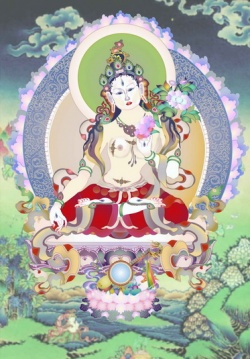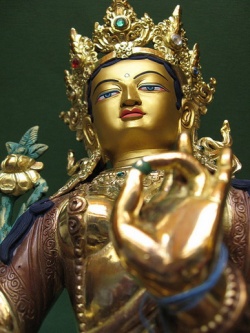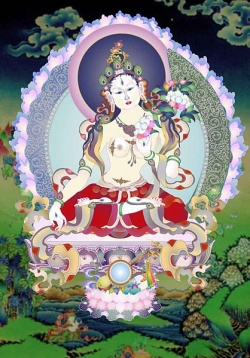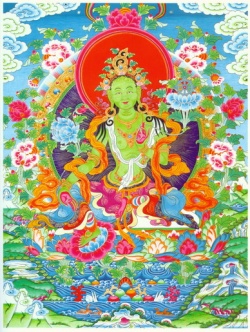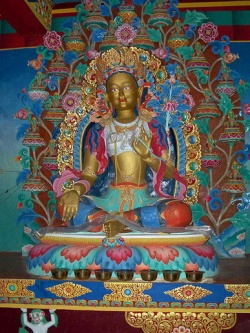Tara and her 20 Sisters Tackle Climate Change
Climate Change presents us with difficulties and fears different from ‘business as usual.’ Many people find it too overwhelming to think about our future. Hiding our heads in the sand won’t help us tackle what needs to be done, in our personal lives or the wider world. If we face up and act quickly, we can create a sustainable way forward more happy and fulfilling for all than what we have now.
Green Tara and her sisters are ancient meditation deities, who still have much to offer us now. They help us deal with fears, then build the strengths and wisdom we need. Even the traditional names of the fears they work with fit our times: problems with earth, water, fire, air - war, political troubles, crime, disease, untimely death, poverty, frustration of hopes and plans.... all these are common themes in any discussion about what we may face.
Tara’s an Engaged Buddhist - a Bodhisattva: she applies Buddhist compassion and ethics to help the world. She doesn’t only sit meditating, beaming vibes at everyone. She’s in there boots and all, dirt up to the elbows, mucking in to help. This is how Engaged Buddhists are: involved, participating.
Many Buddhists think being a bodhisattva has nothing to do with ‘worldly’ things like social action. A huge amount of suffering is caused by our social systems: from human poverty to environmental troubles. Climate change and Peak Oil are already causing suffering for humans, animals and forests. Creating social change, to reduce suffering, is a big part of what we can do to help - especially at this time: ‘You can no longer save your family, tribe or nation. You can only save the whole world.’
Margaret Mead - (quoted by the Change the Dream Symposium)
It's a challenge to work in the world while remembering our moment-to-moment presence, the fluid changing state of our being. How do we immerse ourselves, hands-on, and not lose ourselves, not get embroiled and trapped, in the suffering we hope to alleviate?
The Bodhisattva path isn’t easy. It requires endless compassion towards our own lapses and confusion as well as others’; tuning into everybody's good motivation; not getting caught in activists’ squabbles.
Tara is ‘our own mind in the form of Tara’. We become Tara, to practise what it feels like being awakened. Visualising a deity is like having a conscious dream. The image works in the Depth, where dreams do their healing.
As we were all women on our retreat, we considered how a female deity helps with our conditioning and strengths as women. We practised being proud and confident, to feel the presence of this compassionate Wise Woman within. Lack of self esteem is a common and disabling problem for women. Remembering Tara within keeps us in touch with our fundamental wise compassionate Nature.
We are incarnate, in a human body: and part of our community on this planet. Tara teaches us how to be a human body in the awakened state. Buddhists sometimes say ‘oh well nothing matters, it’s all emptiness.’ Tara shows us how emptiness and form coexist: the wisdom and love of being present in the world. That’s our nature, while we’re in a body.
Tara helps us understand 'emptiness' in a bodily way. We can be fully in body and mind, in this life, while knowing in our cells that it's all love-light, like the light-body of Tara - not 'solid' reality. When we live this two-in-one truth, we’re responsive, fluid, compassionate and joyful.
Tara’s specialty is skilful action, All-Accomplishing Wisdom. We meditated on her methods of compassionate action, represented by her jewellery: generosity, patience, morality, enthusiastic perseverance, concentration. Green Tara’s concerned with all Nature: animals, plants, water and soil.
Together we asked, what kind of culture could we create, if we based it on what Tara shows us? What would sustain us in our future with Climate Change and Peak Oil? How to muck in and help in a wise way? We can create helpful external conditions; we can also help people understand how our inner confusion, greed, hatred and ignorance, create suffering and ineffectiveness within, and for others around us. Our present system of growth economics isn’t carrying us into a healthy future: it’s based on the same greed, selfishness and ignorance as our internal pain.
We need to create a ‘Great Turning’ (Joanna Macy’s term) to a new paradigm, a new system of values. What values does Tara live by? Similar to Mother Nature - life-supporting, co-operative?
Most of us at the retreat are involved in Transition Towns, which are based on the Permaculture model. Permaculture is based on Nature’s ecosystems and life-supporting values. Tara reflects these beautifully.
The 21 Taras lend themselves to deep psychological work: they bridge meditation and psychotherapy. The ‘fears’ Tara protects from include all sorts of emotional distress. The fearful one can be present within us at the same time as the wise one. How can our Wise Woman be compassionate to parts of us not yet so wise? She can hold the distressed one, as if in her arms, support her with gentleness and love, and give her the strength to work with distress. This process of transforming fears to strength is core work of Tara.
We chose three Taras who reflected issues we wanted to work with. As we developed their strengths, the emotional difficulties around that issue arose. For example, the Red Tara of Power embodies rich joyful compassion that celebrates the positive - sympathetic joy. It’s empowering to develop confidence and strength as women. With that warm compassion, ‘female wrath,’ much of it from disempowerment, transmuted into joyful love.
We used methods akin to Namgyal’s clearance work. With Tara’s compassionate awareness, we watched how wrath and other emotions were reflected in the body. That releases the energy locked up in fear and distress and transforms it to strength. Tara’s loving awareness reinforced that work. We also painted, to help the ‘dream’ process along.
Clearance work isn't just about getting emotions clear. There are profound effects. It gives us insight into our body as constantly shifting energy flows - and stucknesses.
It brings us deftly into the present moment. Kenpo Tsultrim Gyatso said to me, ‘the present moment is called the Great Mother, because it is from realising it that all awakened beings are born’. In the present moment a different space opens out. Clinging is the origin of emotional difficulty. In the present moment we’re simply present with what is: there's no chance for clinging. There’s compassion, that’s the essence of being aware.
We might think we're keeping our ‘self’ comfortably in place. Of course, it's not at all comfortable, it's profoundly disturbing and shifts the basis of our habits and ways of operating; and it creates strength and confidence, in a place beyond our isolated personal sense of ‘self’. The energy that's liberated by being present in the moment, transforms into the love-light body of Tara.
It's a beautiful trick. Relax into the Mother Moment in the midst of storms, turmoil and worry: it’s a place for us to remember, not exactly that there's something beyond worldly concerns: there's a place of rest, right there, in its midst. We can constantly go back into let-go if we get caught.
Hands-on compassionate action is mucky, complex and fun. It's fun to exercise the creative power of vision. Meditating withTara uses our creative mind; we create an image of the wise being we aspire to be. Our whole life is creative mind. Being socially involved is also a creative activity. When we create a vision of community, we create a vision of a planet of Taras - 21 zillion of them. What would that be like?
Personal fears from family patterns, and how we cope in our individual lives, are part of a wider context. Our conditioning is created not by parents, but by the social conditioning our parents and everybody else are subjected to. ‘Personal’ work is not separate to social issues and the community around us.
As times change with global warming, personal and social issues will be interwoven. If there’s suddenly no food in the supermarkets we’ll have fears for our safety - and whether our community can work together to keep us all safe.
The 21 Taras are a group of goddesses, who work together and co-operate. This provides a model for an egalitarian group method for meditation teaching and retreat. We can practise what an egalitarian social order could be like.
I facilitated the group to share in depth about our meditation experience. Everybody became a teacher for everyone else. We heard everyone's experience - common themes, the possibilities, how varied is what can happen. It can be raw, exposing work, as we get our hands dirty in our own conditioning, habitual suffering and confusion. It was important that the group all be loving Taras, and hold each other respectfully, as compassionate wise women.
Sharing the ‘emotional work’ with Tara is not only practising compassion to self and others; we experience the fluid and changing nature of ‘emotion’ - and break down barriers that separate us.
Sharing helps us reach depths with the technical process of meditating: detail about how we respond to what came up in meditation, how we work with it to open up depth and clarity, develop compassionate awareness, and get the feel of what a state of wisdom is like.
One person said she hadn’t just been given a fish: she’d been taught how to fish: tools to do her own growth process.
Tara is the goddess of compassionate skilful means; this way of working with a group is skilful means that produces great compassion, in all of us, as we hear each other's pain and joy.
I love sharing this precious work - seeing the effect of working with Tara. All made tremendous use of it. The honest sharing was held with tenderness by everybody. I marvel at the power of these goddesses, how deeply they move people along.
Three of the group wrote a short bit about their experience of the retreat. It’s in the spirit of the sharing that happened in the retreat itself.
from retreatants:
"The 21 Taras" with Dido Dunlop at the Wangapeka Retreat Centre was a life altering experience! Dido is a wonderful, compassionate teacher. The 21 Taras gave me many positive archetypes to inspire the rest of my lifetime. The Retreat Centre is so condusive to spiritual practice by it's shear beauty, life-affirming permaculture garden, splendid buildings, not to mention the near by Wangapeka River. J
The task........”your retreat experience in 200 words”......... feels like mission improbable for this long winded Sagittarian ... the threads of my entire life felt interwoven with my retreat experience....so squashing and squishing that into 200 words, for that kind ruthless pruning I need Dial a Virgo .
In a nutshell, my ten day retreat was like being inside the erupting core of Mt Vesuvio as it simultaneously endured a 7.5 magnitude earthquake.
A serious encounter with cancer a couple of years ago followed bout after bout of illness meant that virtually all the external structures in my life including my home, friendship ,work and country of residence had been dismantled,. leaving me ripe for more acute observation of the internal landscape.
Severe bouts of depression have been a feature of my life for the last 25 years, first rearing its head in London shortly after my first encounter with the Buddhist teachings. I would attempt to seek refuge, solace and meaning from within the Buddhist teachings during these descents but instead what occurred was a rift, a schism between my lived experience and the Buddhist teachings.
Instead I found meaning and understanding of my inner experience within the field of psychological astrology, a study which has also spanned 25 years.
The absolute magic and gift of this ten day retreat with Dido was that these three threads danced together in a spontaneous ,uncontrived and sustained way.
The healing of this schism was aided by a set of fortunate circumstances. I was the sole retreatant for seven days and Dido responded to this by generously allowing the retreat content to follow my process. This gentle, supportive structure, like a kind ,loving parent and the magic that is Wangapeka seemed to allow my being and my will to relax and to then spew forth what needed to be dislodged, seen and felt thick and fast.
Four months later I continue to process the richness of this experience on a daily basis and it has forever changed my relationship with the Buddhist teachings. A deep thanks to all of you that hold up and support all that is Wangapeka. C
A time of reconnecting with the wellspring, I experienced this retreat as skilful, empowering and democratic - Dido's "Teacher as Faciltator" style places each of us firmly at the centre of our own experience - nothing is discarded, excluded or avoided. The "negative emotions" were a source of transformation, energy and joy. This was my experience of the 21 Taras retreat and my time with Dido and our small group of women at the Wangapeka.
I approached the retreat as an interested, slightly detached observer. I left joyous, connected, grounded and healed- by the teachings, by the deep sharing within the group, by the magic and beauty of the surroundings, and by the ease and simplicity of each day. No harsh regimens - rather, a resonant silence in which I re-learned the power of deep listening- feeling my heart opening to others, and experienicing my energy and happiness returning.
